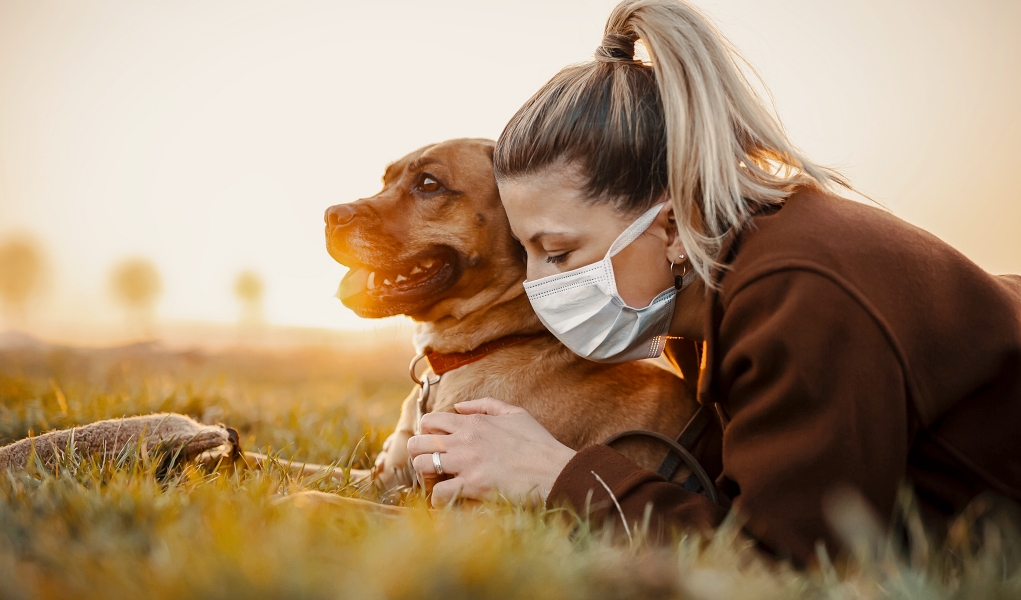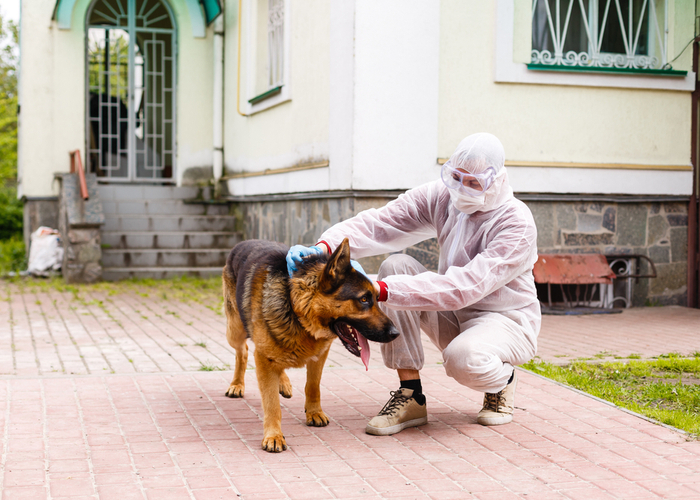While the pandemic is over and most people have resumed the “new normal”, I still often get asked can dogs catch Covid? The disease is still being spread, and the Center for Disease Control (CDC) is still offering guidance, which has some pet owners worried about their canine companions.
The good news is, there is currently no evidence that shows dogs can spread COVID-19. Can my dog catch Covid from me? No.
However, there is a lot more to it than just that. Coronaviruses are a large family of viruses, one of which is the COVID-19 novel coronavirus. Some of these viruses cause illness in people, while others can cause illness in certain types of animals.
Can I catch Covid from my dog? In order to answer this question, I had to do a lot of research and speak with multiple veterinarians.
There is a lot of false information being passed around, and I wanted to be sure that I had the correct information backed by research and advice from experts. Keep reading to see what I found out about the COVID-19 virus and the threat to our beloved pets.
Can Dogs Catch Covid?

There are coronaviruses that infect animals and can be spread to humans. Once a human contracts the disease, it spreads from human to human.
Severe Acute Respiratory Syndrome (SARS), which first appeared in 2002, is an example of a coronavirus that started in animals and spread to humans. However, according to the Centers for Disease Control and Prevention, this is VERY rare.
It is also presumed that this is the case with COVID-19. The CDC has given this official statement:
“The virus that causes COVID-19 can spread from people to animals during close contact. Pets worldwide, including cats and dogs, have been infected with the virus that causes COVID-19, mostly after close contact with people with COVID-19. The risk of pets spreading COVID-19 to people is low.”
If you’re worried about catching Covid from your pet, there is no need for concern.
According to the American Veterinary Medical Association’s Chief Veterinary Officer Gail Golab, “We’re not overly concerned about people contracting COVID-19 through contact with dogs and cats. The virus survives best on smooth surfaces, such as countertops and doorknobs… Porous materials, such as pet fur, tend to absorb and trap pathogens, making it harder to contract them through touch.”
Simply put, the answer to the question can dogs catch Covid is YES.
ALSO: 25 Dog Health Symptoms That You Need To Address Right Away

What to do if you have COVID-19
If you have COVID-19 and have a pet:
- Isolate yourself from everyone else, including your pet. If you are the only one available to care for your pet, you can still provide basic care. If possible, have another person in your household care for your pet.
- Avoid petting, snuggling, being kissed or licked, and sharing food or bedding with your pet.
- If you care for your pet or are around animals while you're sick, wear a face mask.
- Wash your hands before and after handling animals and their food, waste and supplies.
If you have COVID-19 and your pet becomes sick, don't take your pet to the veterinarian yourself. Instead, give your veterinarian a call.
Explain that you have COVID and your dog has started showing symptoms. Your vet may offer advice through a virtual visit or make another plan for treating your pet.
Treatment may not even be necessary. Keep reading to find out more.
What do I do if my pet has COVID-19?
Some signs of COVID in pets may include fever, coughing, difficulty breathing or shortness of breath, lethargy, sneezing, nose or eye discharge, vomiting, or diarrhea.
Obviously, these symptoms could be signs of many other health issues. In the majority of cases, your pet will not require testing for COVID 19.
If you believe your dog may have Covid or you are concerned that he has been exposed to the disease, isolate him in a separate room away from the rest of your family and other pets. Keep your pet at home until he has been symptom free for at least 48 hours.
You should also wear gloves when you interact with your pet or his food, dishes, waste or bedding. Wash your hands after touching any of your pet's things.
DO NOT put a face mask on your pet. DO NOT wipe or spray your pet with disinfectants.
If your pet develops new symptoms or seems to be getting worse, call your veterinarian.
Of the small number of dogs and cats confirmed to have the COVID-19 virus, most didn't show any signs at all. The majority of the pets that did become ill had mild symptoms and could be cared for at home.
It has been very rare that pets become seriously ill after contracting this virus.
READ NEXT: 8 Things Your Should NEVER Do with Your Dog












